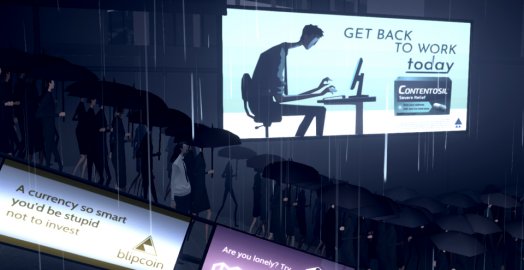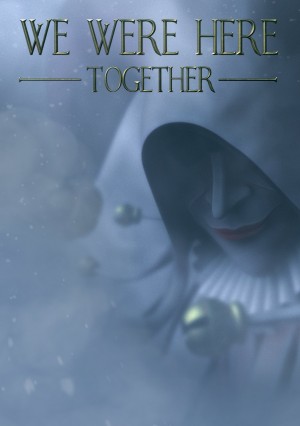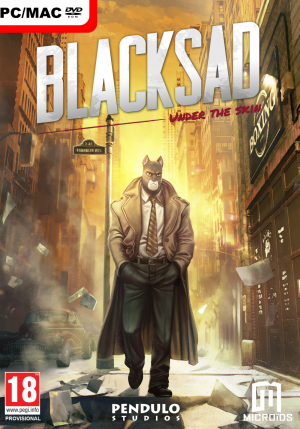Review for Mosaic
Perhaps the only thing that can be said with any certainty about Mosaic is that it is more fully committed to being an unconventional experience than a game in the traditional sense of the word. At every turn, Krillbyte Studio’s experiment pushes the accepted status quo in unexpected, if not always successful, ways. It’s point-and-click adventuring with little pointing and even less clicking. It abolishes traditional puzzles altogether and delights in the sheer futility of the minigames that pepper your path. It’s a game about the quiet desperation of the fall-in-line loner that hammers home its message through moments of ecstatic color and fascinating beauty. It rewards those willing to plumb its depths for meaning, though it just might be too clever and overwhelmingly strange for its own good.
Trying to describe the plot of Mosaic is, by design, a bit of a futile endeavor. The game exists as a testament to the sheer void of narrative found in a drone-like existence. Our unassuming protagonist wakes up each day, listlessly brushes his teeth (or not – it’s up to you), and lumbers his way to his meaningless job, just one out of countless cogs making the machine go round in interminable circles, only to start the dead-end cycle again the next day.
To add insult to injury, this unnamed man is constantly reminded of the hopelessness of his station, of his lack of value to the soulless mega-corporation he works for and society in general. His bills remain unpaid, his bank account (accessible via an app on his phone) perpetually in the red. He adopts the fearful manner of a beaten dog when opening his mailbox, shying away with hunched shoulders from the overdue invoices mocking him from within. Text messages from his employer offer daily confirmation that his output is subpar compared to others, and that, due to reporting late to work, his contract will soon be up for termination. His existence, in short, is in a constant state of sliding down a slippery slope with neither handholds nor lifelines to slow the fall.
The game’s low-poly visual design mirrors its sense of suffocating despondence with stark, monochromatic shades of black and blue. Still, there’s beauty in the spartan color scheme, an overall sense of care given to the sharp lines and impressive angles formed by rays of light perforating through your apartment window blinds, or by banks of escalators, seemingly leading nowhere, stretching interminably into the distance. This is a world heavily filtered through one man’s alienated perspective, the throngs of citizens on their way to work resembling hundreds upon hundreds of black-clad worker ants, all marching to the same location day after day.
But perhaps the best part of the drab palette is the way it makes the rare splash of color that does exist pop so brilliantly. There’s an intense beauty to these scenes, a deep breath of fresh air, like when our hero catches a glimpse of a bright yellow butterfly across the street on his way to work, then follows it with rapt attention for a prolonged gameplay segment in which you actually control the butterfly, flying from left to right, avoiding obstacles, as the protagonist slowly keeps pace in the background.
Similar moments occur when catching sight of a brilliant sunrise through a window or spying a gap in a tall fence at the edge of the city. It’s clear that these are slivers of escape, when something sparks the imagination and causes the mind to break free of its dreary existence, when the hero dares to bask in a joyful moment or two that penetrates the tedium. Then comes the relentless shift back to dullness when the occasion passes and the daily grind makes its overwhelming presence felt again. It’s impressive how these fleeting respites weigh on your mind, all without a single line of spoken dialog.
The gameplay in Mosaic is fairly light, so as not to get in the way of the emotional experience. The mouse is used to interact with a sparse few objects in the environment – nothing to the point of even picking up an item to carry along, mind you – and to guide the protagonist on his way, though the prolonged button holds required to keep him moving combined with the shifting and scrolling camera view do occasionally cause him to get snagged on a corner you have to then manually guide him around. There was also one particular late-game point when I had to exit and restart (and retrace some of my steps, as the game only saves at the beginning of each chapter with no way to manually record your progress) due to some critical hotspots failing to load, leading to me being stuck in a location with no way to advance.
Then there are the handful of times when Mosaic has something to prove with its gameplay. Whenever our protagonist sees something that catches his attention, colorful circles appear over his head, and clicking them triggers a short cinematic in which he forgets his surroundings and allows himself to be completely immersed in a moment of living as opposed to just existing – as vivid color briefly fills his world, you can almost imagine his heart beating just a bit faster in hopeful anticipation. Of course, reality comes calling again as soon as the cutscene ends, and the shift back to grayscale life causes both the player’s and protagonist’s spirits to come crashing back down with an almost perceptible thunk.
As counterpoint to these brief periods of optimism, the daily grind portion of the gameplay is punctuated by dull, menial activities, like the optional grinding game, Blip Blop, available via the man's phone at any time, which busies you with repeatedly clicking a button to earn points, then trading them in for faster and higher multipliers to keep the game going for perpetuity. The protagonist’s desk job consists of an equally laborious and meaningless simulation minigame about allocating enough resource markers to fill a progress meter until an arbitrary daily milestone is reached.
It’s understood that these diversions are dull by design, emphasizing that there is no escaping the senseless loop of life in which your avatar finds himself. Mosaic wants to make a statement about social isolation, about depression, about the failure to find personal fulfillment. This is occasionally accomplished in concrete ways – the awkward reshuffling of individuals in the elevator car or at the subway station to avoid standing too close to one another is just one example – but more often the game features bizarre depictions and metaphorical visuals dripping with subtext.
It’s a disquieting moment when, while brushing his teeth, the protagonist leans over the sink to cough up a large goldfish; reality then completely takes a backseat as your piscine visitor strikes up a conversation with you and asks to accompany you to the office. Heading to work sees the man caught between fellow workers who obediently step onto a conveyor belt – trapping him between them – to be inexorably fed into a row of oversized meat grinders. With events like these regularly sprinkled in, it’ll be rare for your brows not to be knit together in contemplative confusion. It’s thought-provoking stuff, but a little difficult to squeeze much gaming satisfaction from.
Even the sound design does its part in weaving this otherworldly feeling through stretches where the man-made noises of city life are from time to time underscored by unnerving tonal acoustics – not quite music but certainly scored and performed like it. Likewise, the blissful moments of colorful serenity have their own instrumental accompaniment, this time pretty and peaceful. There’s a little of everything, and, like the game’s short 2-3 hour runtime, none of it overstays its welcome.
It’s difficult to rate Mosaic purely as a game one plays for entertainment. It certainly has the skeleton of one holding it up, but really it is more of an art installation than a piece of interactive fiction. It never outright challenges you with puzzles or skill-based progression barriers but rather asks you to spend time on some simple minigames designed as nothing but pure time wasters. It doesn’t have a story to tell so much as a feeling to communicate, but it does so quite well and certainly in interesting if obtuse ways. Of course, operating so far outside the circle of accepted norms also comes with a big red caution sticker, as one needs to be in the right frame of mind to appreciate such an unusual title properly.







__large.png)
__large.png)
__large.png)
__large.png)




















